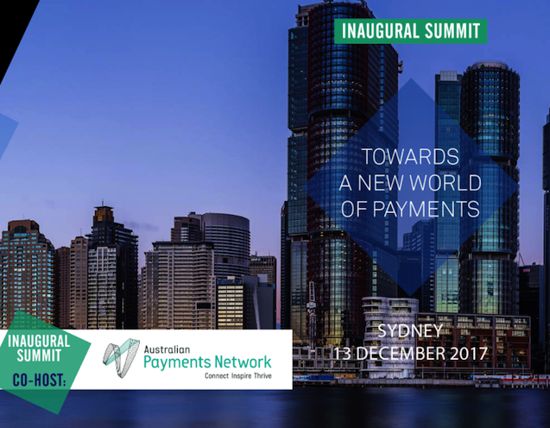CEO's Corner
Welcome to our new look Payments Monitor! We're excited to bring you this issue featuring our new brand identity.
In October, I had the opportunity to participate in two leading global events on the international financial community calendar. Sibos 2017 explored contemporary issues including real-time payments, cross border payments, cybercrime, correspondent banking threats and opportunities, and Fintech. Money 20/20 had a future focus, with topics ranging across AI and robotics, Blockchain, mobile, gender parity, and social demographics. The wide-ranging topics covered at these events reinforced the pace and scale of change in payments - and Australia is no exception.
We are delighted with the progress being made here in introducing an open loop payments environment for transport. The NSW pilot started on the Manly ferry in July, giving commuters the option of using their own debit or credit card to tap on and off. We are now working with industry, and transport authorities across Australia to develop a national framework and roadmap for open loop transport.
Fraud prevention remains a key focus and we continue to coordinate industry measures through our Issuers and Acquirers Community. The latest Australian Payments Fraud Report providing data for 2016, highlights recent industry initiatives to tackle growing online fraud. More on this is provided in this issue.
In August, AusPayNet supported the Australian Payments Council’s industry-wide hackathon. Taking part on the judging panel in Sydney, I was struck by the range of apps the teams created that clearly illustrated the value of transactional data. It was particularly pleasing to see the collaboration between the 120 participants including developers, designers and business representatives.
Our inaugural Australian Payment Summit, which will be held in Sydney on 13 December, will focus on innovation and collaboration, exploring emerging issues and topics in-depth. Developments around real-time payments, digital identity, and Open Banking are core components of the program, with an opening keynote address from Dr Philip Lowe, Governor of the Reserve Bank of Australia.
We hope many of you are able to join us at this new industry event.
Industry Events
We invite you to join us at the inaugural Australian Payments Summit, on 13 December 2017.
We were pleased that so many of our members were able to join us at our recent ‘Insider’s View of Digital Identity’ forum.
Australian Payment Summit
AusPayNet has teamed up with Transactives, the leading conference organiser of European Payment Summit and Global Payment Summit, to bring the Australian Payment Summit to Sydney on 13 December 2017.
Working closely with Transactives, we have secured a program of more than 20 high-calibre industry speakers for the inaugural one-day event themed “Towards a New World of Payments”. We are delighted to have Dr Philip Lowe, Governor of the Reserve Bank of Australia as the opening keynote speaker.
The summit will bring together professionals, decision-makers and disrupters from across the country and abroad to discuss some of the most pressing topics in payments. These will include digital identity, open banking and fraud.
We look forward to welcoming our members, the wider payments community, and anyone with an interest in payments. Registration for the event is now open on the Australian Payment Summit website.
More details about the program are available via the link below.
An Insider's View of Digital Identity
Digital ID was the topic of the day recently when we hosted a member forum, bringing together international speakers:
- Chuck Hounsell, Senior Vice President Payments, TD Bank
- Andre Boysen, Chief Identity Officer, SecureKey
- David G.W. Birch, Author and Consult Hyperion founder
We were pleased that so many of our members were able to join us to hear first- hand how the Canadian banks stimulated the identity market.
Chuck spoke about the importance of collaboration in creating an identity community and described his professional journey in successfully persuading his peers in other banks to work on the development of a joint identity proposition. Andre Boysen built on Chuck’s message describing how SecureKey was instrumental in establishing the Digital Identity and Authentication Council of Canada (DIACC). DIACC extends the community of participants to a much broader set of organisations, including telecommunications organisations and retailers.
Dave Birch rounded off the afternoon with some insights into the future of money from his new book Beyond Babylon Before Bitcoin which led to interesting debate among members!
If you were unable to attend the event but would like to hear more, please get in touch and we will share the presentations with you. For more information on DIACC click on the link below.
Selected Articles See All >
Industry News
In July, we released the Australian Fraud Report for 2016. Card-not-present fraud remains a key focus for the industry.
We supported the recent Standards Australia - Digital Transaction Technologies Forum.
Australian Payments Fraud Report 2017
In July, we released the Australian Fraud Report; Jan-Dec 2016 Data, which highlights trends in payments fraud.
The most recent figures show that Australians continue to embrace the convenience of cards, spending more than ever on them. They also show that as payments are increasingly moving online, so are fraudsters. In 2016, card transactions totalled $714.5 billion, of which 0.074% was fraudulent, with 78% of this occurring online.
In addition to highlighting the key trends, the report provides information on industry initiatives to combat online fraud, including:
- New research to help better target preventative measures. The research covers the impact of card-not-present (CNP) fraud on consumers, learnings from other countries, and how the online payments landscape and fraud are changing.
- New guidelines for issuers and acquirers outline best practice for CNP fraud detection, customer authentication, and data security.
- Building a merchant education program to generate greater awareness of CNP fraud and prevention measures.
Australia is well-advanced in fraud prevention technology, as a result of the industry’s leading investment in EMV chip technology, tokenisation and online customer authentication tools.
The Australian Payments Fraud Report 2017 (January 2016 – December 2016) is available via the link below.
Standards Update
We were delighted to support Standards Australia’s Digital Transaction Technologies Forum on September 29. The development of standards to ensure the security of financial transactions forms an important part of AusPayNet’s industry work. Standards Australia offers important insights about the role of standards:
“Australia is one of the global leaders in the adoption of digital technologies and a hub for the finance industry. Australia’s financial services sector is the largest contributor to the national economy, contributing around $140 billion to GDP over the last year and the World Economic Forum Financial Development Index of 2012 rated Australia as one of the world’s best performing financial centres. The accelerating rate of technological change and increasing penetration of mobile devices, combined with shifting customer preferences, is having dramatic implications for the ways in which financial services are structured, delivered and consumed. Standards play a key role in promoting best practice, safeguarding consumers and ensuring our financial sector is efficient, predictable, sustainable and internationally competitive. The use of standards allows for automation of complex financial transactions and standards make the technical aspects of these implementations easier, cheaper and faster.”
Discussion at the forum covered emerging financial transaction technologies, particularly within the payments industry and considered the need for standardisation in this area.
Australian Payments Fraud Report 2017 Digital Transaction Technologies Forum
Regulatory Round-up
We provide updates on the ATM Access Code Review & the Productivity Commission Inquiry into Competition in the Australian Financial System.
ATM Access Code and Access Regime
We recently reviewed the ATM Access Code which was introduced in 2009, alongside the Reserve Bank of Australia’s Access Regime, to facilitate access to the ATM network. As part of the review, stakeholders shared their perspectives on future directions and innovation trends within the ATM industry.
In August 2017, the Payment Systems Board (PSB) discussed the findings of the industry consultation, including the industry's planned process to review and update the access framework.
This work is ongoing with outcomes expected in 2018.
Productivity Commission Inquiry into Competition in Financial Systems
The Productivity Commission (PC) recently undertook an inquiry into Competition in the Australian Financial Systems to examine competition across different financial products and markets.
The focus of the inquiry is to establish whether there are barriers to competition through innovation, and – where innovation does occur – whether its benefits are directed towards consumers.
The enquiry further complements work previously undertaken by the PC in:
- Data Availability and Use and Competitiveness
- Efficiency of the Superannuation System
The Competition in Financial Systems inquiry takes a holistic view of financial products and services provided to households, small businesses and large corporations.
Our submission provided context on recent drivers of innovation and competition within the payment industry - both in Australia and internationally; in addition to illustrating how We have played a pivotal role in driving improvements to the payments system.
Read the submission via our website. Visit the Australian Government Productivity Commission for more on the process for public inquiries.







